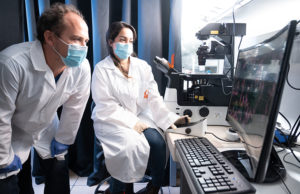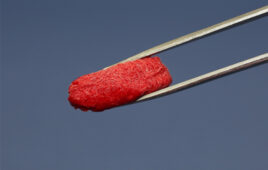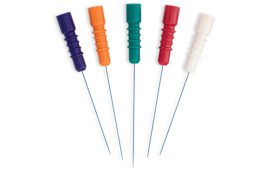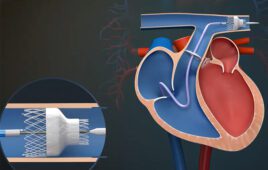
Ph.D. student Esti Toledo and postdoctoral candidate Guillaume Le Saux at Dr. Mark Schvartzman’s laboratory at Ben Gurion University (Photo by Dani Machlis)
Researchers in Israel are developing long-lasting, antiviral coatings for high-touch surfaces as doorknobs to reduce the spread of COVID-19.
These novel coatings contain nanoparticles of safe metal ions and polymers with anti-viral and anti-microbial activity, according to the researchers at Ben-Gurion University (Beer Sheba) and the National Institute of Biotechnology in the Negev.
Even in small quantities, certain metals can be lethal to viruses and bacteria but are not poisonous to humans. In proof-of-concept experiments, the researchers assessed the effect of surfaces coated with nanoparticles of various metals on the infectivity of lentiviruses, which belong to the HIV family, in human cells. Findings show that surfaces coated with copper nanoparticles strongly block infection of the cells by the virus. These ongoing experiments show potential for copper ions in preventing surface-mediated infection with SARS-CoV-2, according to the scientists.
Based on these findings, the researchers are developing anti-viral coatings that can be painted or sprayed on surfaces. The polymer-based coatings contain nanoparticles of copper and other metals, which will enable controlled release of metal ions onto the coated surface. Because the release of ions is extremely slow, the coating can be effective for a long period of time — weeks and even months, and it will reduce the infectivity of the virus particles by more than 10-fold, the researchers said.
The research is being led by Angel Porgador, a professor in the Department of Microbiology, Immunology and Genetics at Ben-Gurion University and the National Institute of Biotechnology in the Negev, and Dr. Mark Schvartzman, the Department of Materials Engineering at Ben Gurion. The Israel Innovation Authority is supporting the research.
Until now, using such metals for anti-viral applications has encountered significant challenges due to the metals’ tendency to oxidize and corrode, according Schvartzman. Nanoparticles provide a solution to these obstacles and offer a large surface-area-to-volume ratio, which results in an efficient anti-viral surface area using a relatively small amount of metal, he said in a news release.
“While current surface disinfection methods rely mostly on substances that are poisonous for people, such as bleach, or on substances that evaporate readily being based on alcohol, the coating that we are developing is based on metals that are toxic for viruses or bacteria, but completely human friendly,” Schvartzman added.
“Research shows that the virus remains viable on various surfaces for extended periods of time, of days and even longer,” said Porgador. “Therefore, there is a clear need for durable anti-viral coatings that can be sprayed or painted on surfaces, just like paint or varnish, and that will prevent viral transmission.”
The coatings will be effective not only against the coronavirus but also against other viruses, as indicated in proof-of-concept experiments, and also against bacteria, so they will be relevant for a wide range of applications, Porgador added.
The researchers are developing the coatings with BGN Technologies, the technology transfer company of Ben Gurion University.
“The product will be efficient as a general anti-viral and anti-bacterial coating,” said Josh Peleg, CEO of BGN Technologies. “It can be applicable for medical settings, as an anti-pathogenic substance in places with increased risk of contamination, such as hospitals, but also for home use, and in public spaces such as schools, airports, public transportation and cinemas.”




